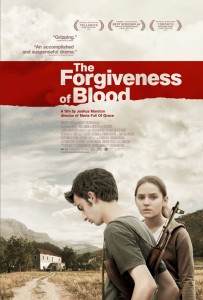The Forgiveness of Blood – Movie Review
Wednesday, February 22nd, 2012 6:22:23 by Fahad Zafar
The Forgiveness of Blood – Movie Review
There’s something strange about Albania, at least to Western eyes. No, two things are spooky. First, when that country was under Communist rule, it was as isolated as North Korea is today. Sporting monuments of Stalin, the Albanian government was against
the road of moderation that the Soviet Union had chosen. Identifying themselves as Maoists, the country’s only ally was China.
Second: With "The Forgiveness of Blood," director Joshua Marston, working with a script he penned with Albanian-born Manhattan resident Andamion Murataj, graphically shows us that the country still has the concept of blood feud in its laws. This means that
if your dad kills someone else’s son, the entire male family of the murderer can be targeted for revenge. It’s one thing for George Bush to go after Saddam because "this is the guy who tried to kill my dad!" (Sept. 27, 2002). It’s another thing to lust for
revenge against all the males of the aggressive family. The war in Iraq?
This time Joshua Marston incorporates his skill at connecting with foreign cultures while at the same time playing his new movie in a lower key than "Maria, Full of Grace," (my favorite pic in 2004). In that one a pregnant Colombia teen becomes a drug mule
to bring desperately needed money to her family. With "Forgiveness of Blood," a family’s desperation results from the father’s act of killing a neighbor, Sokol (Veton OsmanI) after Sokol had blocked his land with rocks, forcing Mark (Refet Abazi) together
with Mark’s brother to murder the landowner. The family of the dead landowner is hell-bent on revenge, though there are two ways out. One: If the killer and male members of the family stay at home to show their respect for the loss, they will not be bothered.
This means that Nik (Tristan Halilaj), who is Mark’s 17-year-old son and who is ambitious enough to want to open an internet café, cannot leave the home. He cannot go to school, he cannot pursue his flirtations with the school beauty, nor can Nik’s sister,
Rudina (Sindi Lacej), continue in school because she is forced to take over her dad’s business of delivering bread. Two: If the killer is given a long sentence in jail, the aggrieved party may be willing to negotiate. Nonetheless, in this story, Nik is given
a "besa," or free pass, for just two weeks, allowing him to walk around outside his home.
The movie’s excitement comes from director Marston’s ability to coax terrific performances from a thoroughly non-professional cast, ordinary people living in the mountainous northern part of Albania, folks who had been recruited after an extensive campaign
by the production team. Marston also prepares us for what is to follow in an opening scene where men at a cafe seem simply to be teasing each other, but there is nothing good-natured about the palaver. "Sometimes the long road is shorter. And safe," says Sokol,
who had barricaded his land which he had been granted by the government in return for working it. What trips up these characters is pride, the notion that pervades the theme of Greek tragedy as well. Without pride, life is nothing; these Albanians appear to
say in a film that uses music on the soundtrack only sparingly and is too static to bring in more than an art-house audience.
The Albanian title is "Falija e Gjakut" which means literally "forgive the blood." The film had been submitted by Albania for Best Foreign Film Oscar consideration was rejected after another Albanian director noted the input by American artists. The MPAA
disqualified it as well.
Short URL: https://www.newspakistan.pk/?p=13594

















